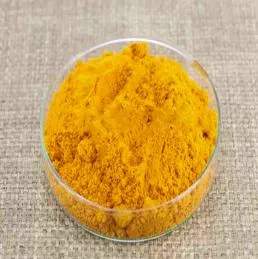- No. 268 Xianghe Street, zone de développement économique de la ville de Xingtai, Hebei 054001 Chine
- Byron@hbhongri.cn
Ground Turmeric: A Modern Examination of an Ancient Spice
Ground Turmeric, The rhizome of a ginger plant has been widely used by humans for a long time. Grinding its roots into powder, known as Ground Turmeric powder, is not only an important seasoning in Asian cuisine, but also plays an important role in traditional medicine, textile dyeing, and even modern nutritional supplements. This article will examine Ground Turmeric powder from its historical origins, chemical composition, and application value, and explore its influence in different fields.

The usage history of Ground Turmeric can be traced back thousands of years
Archaeological evidence suggests that as early as 2500 BC, people in the Indus Valley civilization began using curcuma longa turmeric root powder as a spice and dye. In traditional Indian medicine Ayurveda, Ground Turmeric is considered to have various medicinal values, used to treat inflammation, digestive problems, and skin diseases. With the expansion of trade, Ground Turmeric has gradually spread to various parts of the world and taken root in culinary cultures in Southeast Asia, the Middle East, and Africa.
The unique flavor and color of Ground Turmeric are mainly derived from its chemical composition, with the most important component being Ground Turmeric extract
Ground Turmeric is a polyphenolic compound with strong antioxidant and anti-inflammatory properties. In recent years, a large amount of scientific research has focused on the potential health benefits of poudre de curcuma pure, including anti-cancer, cardiovascular protection, and improved cognitive function. However, it should be pointed out that the bioavailability of Ground Turmeric is low, meaning its absorption efficiency in the human body is not high. Therefore, many studies are exploring ways to improve the bioavailability of Ground Turmeric, such as co administration with piperine (a component in black pepper) or using liposome encapsulation techniques.
In addition to its applications in cooking and medicine, Ground Turmeric powder is also used as a natural dye to color textiles and food
Its bright yellow color also has symbolic significance in traditional religious rituals. In the modern food industry, Ground Turmeric powder is widely used as a food coloring agent to add color to food, such as curry powder and mustard sauce.
Despite the long history and wide range of applications of Ground Turmeric powder, we still need to assess its potential risks
Excessive consumption of raw turmeric powder may cause side effects such as indigestion and nausea. In addition, for certain specific populations, such as pregnant women, breastfeeding women, and patients taking specific medications, caution should be exercised after consulting a doctor.
In summary, raw roots turmeric, as an ancient spice, still holds significant value in modern society due to its unique flavor, color, and potential health benefits. However, we should approach Ground Turmeric powder with a scientific attitude, understand its composition and mechanism of action, and use it reasonably according to our own situation to fully exert its positive effects and avoid potential risks. Future research should continue to explore the bioavailability and clinical applications of Ground Turmeric, providing more evidence for people to better utilize this natural resource.
Ground Turmeric FAQs
Is Ground Turmeric and Curcuma the same thing?
Curcuma is the genus name of Ground Turmeric plants (scientific name: Curcuma longa), referring to the entire plant or its fresh rhizomes.
Ground Turmeric is a powder made by grinding dried Curcuma roots and stems, commonly known as "Ground Turmeric powder".
Key difference: Curcuma can be in fresh or dry form, while Ground Turmeric specifically refers to powder form.
What are the main uses of Ground Turmeric powder?
Cooking:
Natural coloring agents for curry, stew, and soup (such as Indian curry and Thai yellow curry).
Marinated meat (such as Middle Eastern grilled meat, Indonesian Ground Turmeric rice).
Beverages (Huangjin Milk, Ground Turmeric Tea).
healthy:
Anti inflammatory supplements (need to be combined with black pepper and fat to enhance absorption).
Used in traditional medicine to alleviate digestive disorders.
other:
Natural dyes (textile, handmade).
Skin care (some facial mask or anti-inflammatory creams).
Why is Ground Turmeric powder often used with black pepper?
Scientific reasons:
The active ingredient of Ground Turmeric, Curcumin, is not easily absorbed by the human body.
Piperine in black pepper can increase the absorption rate of Ground Turmeric by up to 2000%.
Practical advice:
Add 1/4 teaspoon black pepper and 1 teaspoon Ground Turmeric powder in proportion during cooking.
Compound formulas of both are commonly found in health supplements.
Does Ground Turmeric powder have any side effects or contraindications?
Common precautions:
Staining: Easy to stain skin and clothing, use gloves.
Stomach irritation: Taking a large amount on an empty stomach may cause discomfort.
Drug interactions:
Anticoagulants (such as warfarin) increase the risk of bleeding.
Diabetes drugs → may enhance the hypoglycemic effect.
Special populations: Pregnant women and patients with gallstones should use with caution.
Suggested dosage: ≤ 1 teaspoon (approximately 3 grams) per day.
How to select and preserve high-quality Ground Turmeric powder?
Selection techniques:
Color: Bright orange yellow, without redness or dullness (adulteration may contain heavy metals).
Odor: Rich earthy aroma, no moldy or chemical smell.
Certification: Choose organic certification or reputable brand (to avoid pesticide residues).
Save method:
Sealed container, protected from light and moisture (can be refrigerated).
Shelf life: 12 years unopened, 612 months after opening.
-
Capsicum frutescens oleoresin – High Purity, Food GradeNouvellesNov.17,2025
-
Capsicum Frutescens Oleoresin – Natural Heat & FlavorNouvellesNov.17,2025
-
Peppereka Powder – Fresh, Vibrant Color & Sweet AromaNouvellesNov.17,2025
-
Paprika Oleoresin | Natural Red Color, Heat & Flavor BoostNouvellesNov.17,2025
-
Pure Turmeric Extract 95% Curcumin | Potent, Lab-TestedNouvellesNov.17,2025
-
Red Papper Pods – Premium Sun-Dried, Bold Heat & AromaNouvellesNov.10,2025







